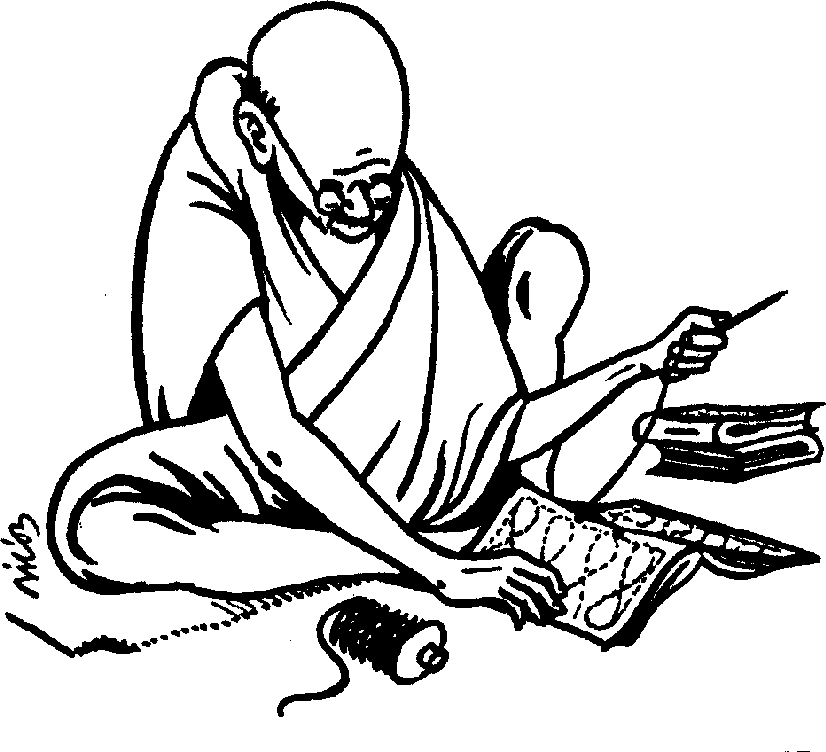

1. Toiler |

A busy barrister advised his clients not to ruin themselves by wasting time and money on litigation and to settle their disputes out of the court through arbitration. In his leisure hours, he read books on the religions of the Hindus, Muslims, Christians, Parsis and Buddhists. He also read books written by wise men. This study of books and a search within convinced him that each day every person should do some manual labour. It was not enough to do only brain work. The literate and the illiterate, the doctor and lawyer, barber and scavenger should be paid equal wages for their work. He slowly changed his way of life in an ashram with his friends and family. some of his European friends wanted to share that ashram life, They all lived like hard working self-reliant farmers, ploughing the land and tending the orchard. No paid servants were employed. On that farm, Hindus and Muslims, Christians and Paris, brahmins and shudras, labourers and baristers, whites and " blackies", all lived as members of one big family. In a common dining room, they ate meals prepared in a common kitchen. their food was simple, their dress coarse. Each member got Rs. 40 for his monthly expenses. The barrister lived on the same allowance, though he was then earning Rs. 4,000 per month. He followed a routine of hard work with clock-like precision and took rest for six hours a day. When a hut was being built on the farm, he was the first man to climb to the top of the structure. He was wearing coarse blue overalls with several pockets, and nails. A hammer peeped out from one of the pockets. A small saw and a borer hung on his belt. day after day he worked in the scorching sun with his hammer and saw. One day, after his meal, he sat to make a book-shelf. He worked for seven long hours and finished the shelf reaching right up to the ceiling. A path leading to the ashram needed metal ling but he had not enough money to meet the cost. He began to collect small stones on his way back to the ashram from his regular daily walks. His companions followed his example and, in a short time, a pile of stones for paving the path rose in the yard. Thus he made others work. Even the ashram children took part in gardening, cooking, sweeping, carpentry, leather work and type-setting. Early in the morning , the barrister ground wheat in a hand-mill, then dressed up and walked five miles to reach his office. he would clip his own hair and wash or iron his clothes. He would keep awake a whole night nursing plague-stricken miners. He would wash the wounds of a leper and would not feel ashamed to clean latrines. he knew to laziness, fear or hatred. He wrote articles for his journal, typed them out himself, composed them in his own printing-press and, if necessary, lent a hand in working a hand-driven printing machine. He was good at binding books. The creative hand that wrote inspiring editorials and letters, spun thread on a charkha, wove on a loom, cooked new dishes, used a needle skillfully and tended fruit trees and vegetables, was equally adept in tilling land, drawing water from a well, hewing wood and unloading heavy goods from a cart. When in jail, he had to dig hard, dry ground with a pickaxe or sew torn pieces of blankets for nine hours a day. When he felt very tired, he prayed to God for strength. The very idea of failure to do any allotted task was intolerable to him. In the prime of his life, he more than once walked 40 miles a day to buy things from a store in the nearest town. Once he walked 55 miles in one day. As a voluntary stretcher-bearer, he carried mounded soldiers from 30 to40 miles at a stretch. Even at 78, for weeks, he worked 18 hours a day. Sometimes his working hours extended to 21 hours. At that age , he could not do any physical labour barring spinning, but was fit enough to walk barefoot three to five miles every wintry morning on a dew soaked village path. For his amazing devotion to and capacity for work, he won the title of Karmavir from his South African colleagues. Karmavir Mohandas Karamchand Gandhi was born on October 2, 1869. |